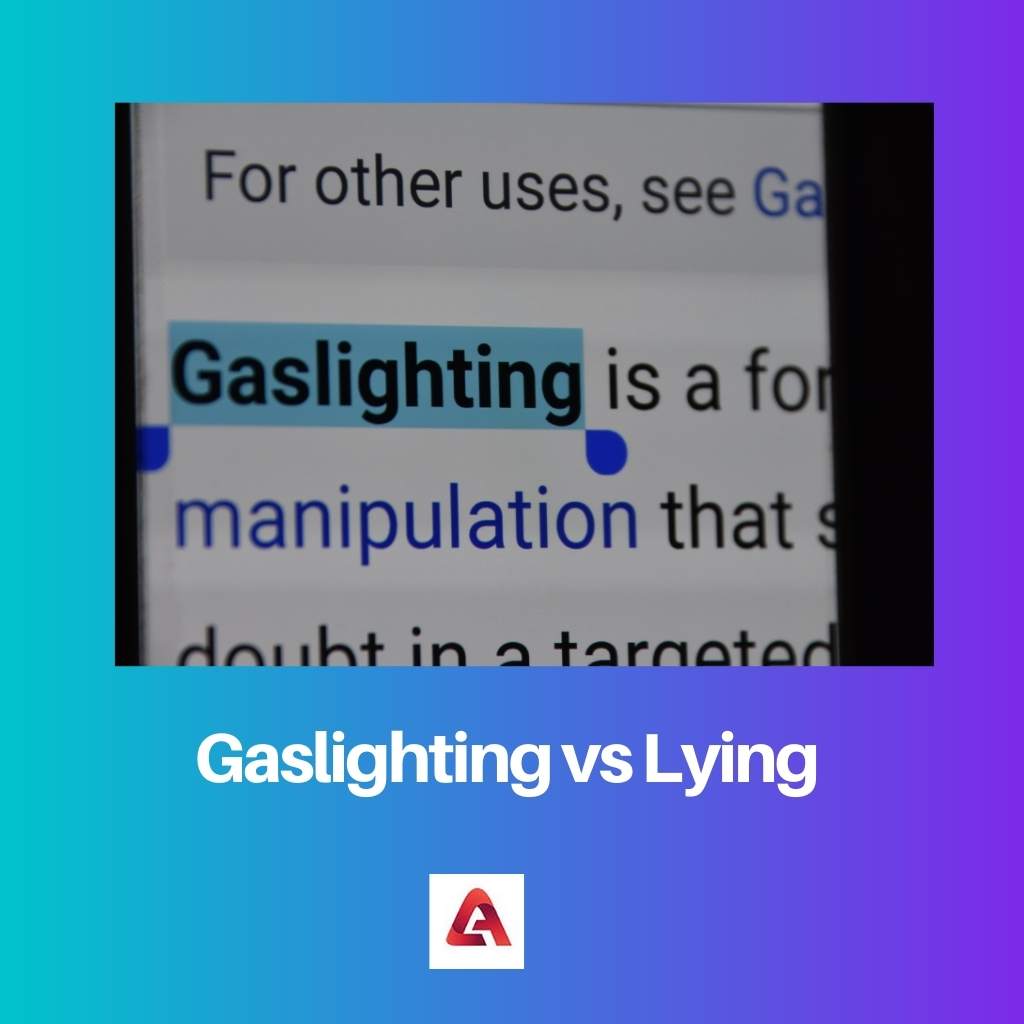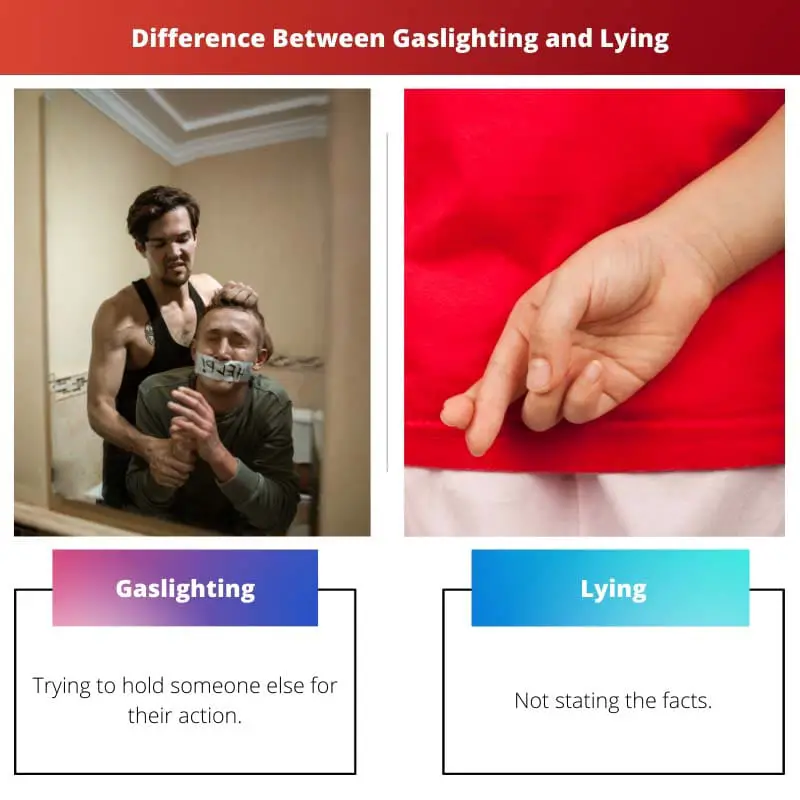Gaslighting involves manipulating someone into doubting their own perception, memory, or sanity, through subtle psychological tactics, causing confusion and self-doubt. Lying, on the other hand, is a straightforward act of providing false information with the intent to deceive, without necessarily targeting the individual’s perception or mental state.
Key Takeaways
- Gaslighting is a form of emotional abuse in which a person manipulates someone else’s perception of reality to make them doubt their memory or perception, whereas lying involves intentionally making a false statement.
- Gaslighting can cause a person to question their sanity, whereas lying can cause mistrust or disbelief in the liar.
- Gaslighting is a tactic used by abusers to maintain power and control over their victims, whereas lying can be used for a variety of reasons, such as to avoid punishment or gain an advantage.
Gaslighting vs Lying
The difference between Gaslighting and Lying is that in Gaslighting, a person tries to manipulate others with an agenda of making them feel guilty about the mistake or activity he has done, he does this by manipulating and gaining power over them, whereas in Lying, a person tells a lie to rush off a situation or anything.

Gaslighting is a type of abuse. The main agenda of a person is to twist situations in his favour so that he can escape from responsibility. This is torture for some people on an emotional level as it leads to manipulation and gaining of power by force. It can be cured with the help of a therapist.
Lying is considered a bad habit where a person is unable or intentionally hides the truth. The reason behind this could be anything, but it is due to fear or irresponsible behaviour. It does not cause any lethal harm but can lead to a certain unhealthy situation. Lying can be easily avoided.
Comparison Table
| Feature | Gaslighting | Lying |
|---|---|---|
| Definition | A form of emotional abuse that manipulates someone into questioning their own sanity or reality. | Deliberately stating information that is known to be false. |
| Goal | To gain power and control over the victim. | To deceive or mislead someone for personal gain, protection, etc. |
| Method | Denial, contradiction, minimization, shifting blame, trivialization, and emotional manipulation. | Fabrication, omission, exaggeration, or distortion of the truth. |
| Impact | Can cause confusion, self-doubt, anxiety, depression, and even post-traumatic stress disorder (PTSD) in the victim. | Can damage trust, relationships, and reputations. |
| Focus | Primarily on manipulating the victim’s perception of reality. | Primarily on presenting false information. |
| Evidence | Often subtle and difficult to prove, relying on the victim’s testimony. | May be easier to detect with evidence or inconsistencies. |
| Frequency | Often repeated and persistent over time. | Can be a one-time occurrence or happen repeatedly. |
What is Gaslighting?
Gaslighting is a form of psychological manipulation that seeks to make an individual doubt their own perception, memory, and sanity. It involves subtle tactics employed by a manipulator to create confusion and undermine the victim’s confidence in their own reality.
Characteristics of Gaslighting
- Denial and Contradiction: Gaslighters deny events or conversations that have taken place, even when there is clear evidence. They may also contradict the victim’s experiences, making them question their own memory.
- Withholding Information: Gaslighters may selectively withhold information to control the narrative, leaving the victim in the dark and unsure of the complete truth. This can contribute to a sense of confusion and dependency on the manipulator.
- Projection of Blame: Gaslighters frequently shift blame onto the victim for the manipulator’s actions or behavior. By making the victim feel responsible, the gaslighter further erodes their self-confidence and self-trust.
- Diminishing Feelings and Experiences: Gaslighters downplay the victim’s emotions, making them feel that their feelings are irrational or unwarranted. This tactic invalidates the victim’s experiences, fostering self-doubt.
Impact of Gaslighting
- Emotional Distress: Gaslighting can lead to profound emotional distress as victims grapple with the dissonance between their experiences and the manipulator’s narrative. This can result in anxiety, depression, and a diminished sense of self-worth.
- Isolation: Gaslighters may isolate their victims from friends and family, creating a dependency on the manipulator for validation and support. This isolation makes it harder for the victim to seek outside perspectives and reinforces the gaslighter’s control.
- Self-Doubt and Confusion: The consistent manipulation and invalidation of the victim’s reality instill a pervasive sense of self-doubt and confusion. Gaslighting erodes the individual’s trust in their own judgment, making it challenging to discern truth from manipulation.

What is Lying?
Lying is a deliberate act of intentionally providing false information or misleading statements with the intent to deceive others. It involves the conscious choice to present information that deviates from the truth, creating a false narrative.
Characteristics
- Intent to Deceive: Lying is distinguished by the underlying motive to deceive, whether to protect oneself, gain an advantage, avoid consequences, or manipulate others.
- False Information: A liar knowingly communicates information that is contrary to facts or reality. This misinformation can range from simple fabrications to complex narratives.
- Conscious Choice: Lying is a purposeful and voluntary action. It requires an awareness of the truth and a decision to deviate from it in order to mislead others.
- Communication Medium: Lies can be conveyed through various means, including verbal communication, written statements, body language, or omissions of relevant information.
Impact
- Erosion of Trust: Lying undermines trust between individuals or within relationships, as it introduces doubt and skepticism about the veracity of information shared.
- Potential Consequences: Depending on the context, lying can lead to adverse consequences, such as damaged relationships, legal issues, or reputational harm.
- Ethical Considerations: Lying is considered unethical in many societal and cultural contexts, as it goes against principles of honesty, integrity, and transparency.

Main Differences Between Gaslighting and Lying
- Intent and Motivation:
- Gaslighting involves manipulating someone’s perception and reality to gain control or undermine their confidence.
- Lying is a deliberate act of providing false information with the intent to deceive, without necessarily targeting the individual’s perception.
- Psychological Tactics:
- Gaslighting employs subtle psychological tactics to make someone doubt their memory, perception, or sanity.
- Lying is a straightforward act of presenting false information without necessarily engaging in psychological manipulation.
- Scope of Manipulation:
- Gaslighting aims to create confusion and self-doubt in a person’s overall reality and perception.
- Lying is focused on the specific act of providing false information without necessarily challenging the individual’s broader sense of reality.
- Long-term vs. Short-term Impact:
- Gaslighting can have long-term psychological effects, eroding a person’s self-confidence and sense of reality.
- Lying may have immediate consequences, but its impact is limited to the specific situation or information being falsified.

- https://www.diva-portal.org/smash/record.jsf?pid=diva2:428012
- https://www.tandfonline.com/doi/pdf/10.1080/21674086.1981.11926942
- https://link.springer.com/content/pdf/10.1007/BF00922429.pdf
- https://www.pdcnet.org/jphil/content/jphil_2009_0106_0001_0029_0056
- https://onlinelibrary.wiley.com/doi/abs/10.1111/j.0029-4624.2006.00610.x
- https://www.jstor.org/stable/20009199



